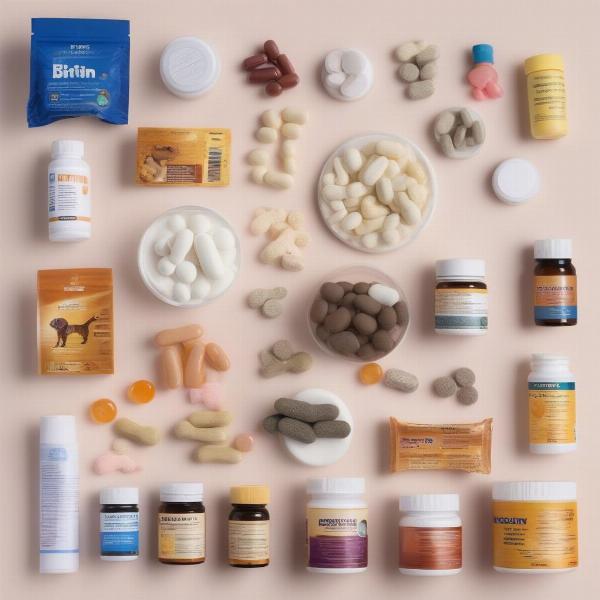Biotin, also known as vitamin B7, plays a crucial role in your dog’s overall health, particularly in maintaining healthy skin, coat, and nails. While a biotin deficiency is rare in dogs, supplementing with biotin can be beneficial for certain conditions and may improve the appearance and health of your furry friend’s fur. This comprehensive guide will delve into the benefits, dosage, potential side effects, and best sources of biotin for dogs.
Understanding the Role of Biotin in Canine Health
Biotin is a water-soluble B vitamin essential for cell growth, fatty acid metabolism, and the production of glucose. It contributes significantly to the health of your dog’s skin, coat, and nails. A deficiency, although uncommon, can lead to dry, flaky skin, hair loss, brittle nails, and even neurological issues. However, before supplementing your dog’s diet with biotin, it’s always recommended to consult with your veterinarian.
Benefits of Biotin Supplements for Dogs
While a balanced diet typically provides sufficient biotin, supplementation can be helpful for dogs with certain conditions. It can be particularly beneficial for dogs suffering from allergies, skin infections, or metabolic disorders that affect biotin absorption. Biotin supplements can also improve coat shine, reduce shedding, and strengthen brittle nails. Some studies suggest that biotin may also play a role in improving joint health and supporting cognitive function in older dogs.
Recommended Biotin Dosage for Dogs
The appropriate biotin dosage for dogs varies depending on their size, age, and overall health. Always follow your veterinarian’s recommendations. Generally, the dosage ranges from 2.5mg to 10mg per day for most dogs. Overdosing on biotin is rare, as it is a water-soluble vitamin, meaning any excess is typically excreted in the urine. However, exceeding the recommended dosage can potentially lead to digestive upset.
Potential Side Effects of Biotin in Dogs
Biotin is generally considered safe for dogs, and side effects are rare. However, some dogs may experience mild digestive upset, such as diarrhea or vomiting, if given excessive amounts. It’s crucial to follow your veterinarian’s recommended dosage and monitor your dog for any adverse reactions.
Choosing the Right Biotin Supplement for Your Dog
Biotin supplements are available in various forms, including tablets, capsules, chews, and powders. When choosing a supplement, look for high-quality products from reputable brands. Consider your dog’s preferences and choose a form that is easy to administer. You can also opt for skin & coat supplements for dogs that contain a combination of biotin and other beneficial nutrients for skin and coat health, such as omega-fatty acids and zinc.
Natural Sources of Biotin for Dogs
Several foods naturally contain biotin and can be incorporated into your dog’s diet. These include organ meats like liver and kidney, eggs, fish such as salmon, sweet potatoes, and brewer’s yeast. If you’re considering incorporating brewer’s yeast and dogs into your dog’s diet, consult with your vet for guidance.
 Biotin Supplements for Dogs
Biotin Supplements for Dogs
Conclusion
Biotin can be a valuable supplement for improving your dog’s skin, coat, and nail health. While it’s essential to consult with your veterinarian before starting any new supplement, biotin is generally safe and can provide numerous benefits. By understanding the role of biotin, its recommended dosage, and potential side effects, you can make informed decisions about your dog’s nutritional needs. You may also consider shed x for dogs and best anti shedding shampoo for dogs as part of their routine. Remember to learn about what is dermaquin for dogs for further information on skin and coat health.
FAQ
-
How do I know if my dog needs biotin? Consult your veterinarian. They can assess your dog’s health and determine if biotin supplementation is necessary.
-
Can I give my dog human biotin supplements? It’s best to use biotin supplements specifically formulated for dogs.
-
How long does it take to see results from biotin supplements? It may take several weeks or even months to see noticeable improvements in your dog’s skin and coat.
-
What are the signs of biotin deficiency in dogs? Dry, flaky skin, hair loss, brittle nails, and lethargy are common signs.
-
Are there any drug interactions with biotin? Consult your veterinarian about potential interactions with any medications your dog is currently taking.
-
Can I give my dog too much biotin? While rare, excessive biotin can lead to digestive upset. Stick to the recommended dosage.
-
What are some other ways to improve my dog’s skin and coat health? A balanced diet, regular grooming, and parasite prevention are crucial for maintaining healthy skin and coat.
ILM Dog is a leading online resource dedicated to providing dog owners with expert advice and guidance on all aspects of dog care, including breed selection, health, training, nutrition, grooming, and more. We are committed to helping you provide the best possible care for your canine companion. Our team of experts is passionate about sharing the latest research, trends, and best practices in dog care. For personalized advice or to learn more about our services, please contact us at [email protected] or call us at +44 20-3965-8624. ILM Dog is here to support you and your furry friend every step of the way.